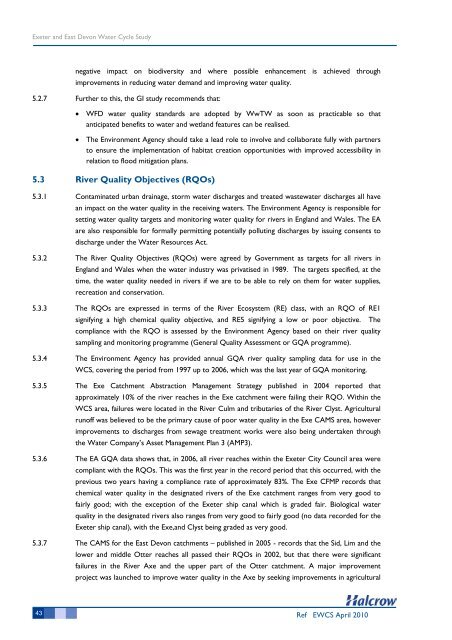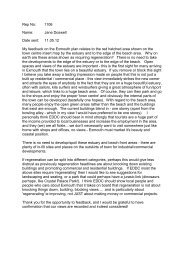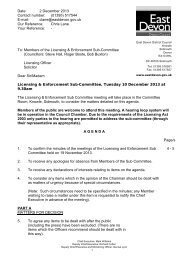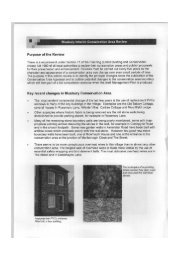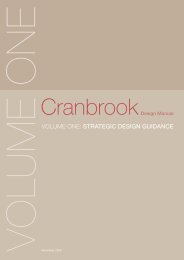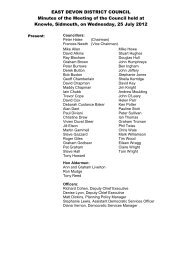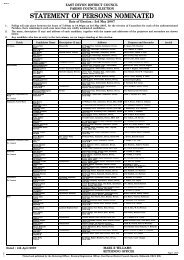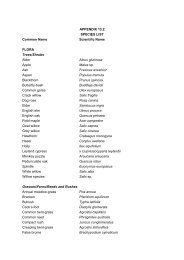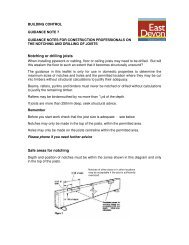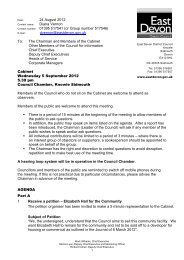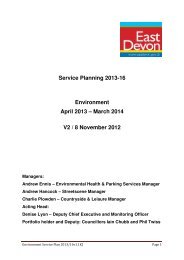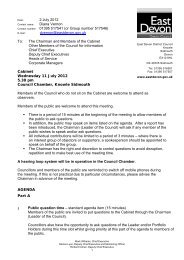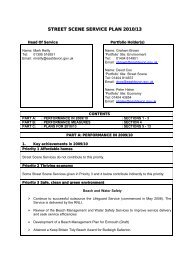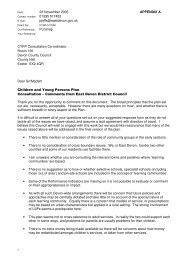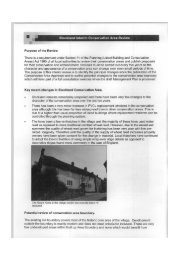Water Cycle Study - East Devon District Council
Water Cycle Study - East Devon District Council
Water Cycle Study - East Devon District Council
Create successful ePaper yourself
Turn your PDF publications into a flip-book with our unique Google optimized e-Paper software.
Exeter and <strong>East</strong> <strong>Devon</strong> <strong>Water</strong> <strong>Cycle</strong> <strong>Study</strong><br />
negative impact on biodiversity and where possible enhancement is achieved through<br />
improvements in reducing water demand and improving water quality.<br />
5.2.7 Further to this, the GI study recommends that:<br />
• WFD water quality standards are adopted by WwTW as soon as practicable so that<br />
anticipated benefits to water and wetland features can be realised.<br />
• The Environment Agency should take a lead role to involve and collaborate fully with partners<br />
to ensure the implementation of habitat creation opportunities with improved accessibility in<br />
relation to flood mitigation plans.<br />
5.3 River Quality Objectives (RQOs)<br />
5.3.1 Contaminated urban drainage, storm water discharges and treated wastewater discharges all have<br />
an impact on the water quality in the receiving waters. The Environment Agency is responsible for<br />
setting water quality targets and monitoring water quality for rivers in England and Wales. The EA<br />
are also responsible for formally permitting potentially polluting discharges by issuing consents to<br />
discharge under the <strong>Water</strong> Resources Act.<br />
5.3.2 The River Quality Objectives (RQOs) were agreed by Government as targets for all rivers in<br />
England and Wales when the water industry was privatised in 1989. The targets specified, at the<br />
time, the water quality needed in rivers if we are to be able to rely on them for water supplies,<br />
recreation and conservation.<br />
5.3.3 The RQOs are expressed in terms of the River Ecosystem (RE) class, with an RQO of RE1<br />
signifying a high chemical quality objective, and RE5 signifying a low or poor objective. The<br />
compliance with the RQO is assessed by the Environment Agency based on their river quality<br />
sampling and monitoring programme (General Quality Assessment or GQA programme).<br />
5.3.4 The Environment Agency has provided annual GQA river quality sampling data for use in the<br />
WCS, covering the period from 1997 up to 2006, which was the last year of GQA monitoring.<br />
5.3.5 The Exe Catchment Abstraction Management Strategy published in 2004 reported that<br />
approximately 10% of the river reaches in the Exe catchment were failing their RQO. Within the<br />
WCS area, failures were located in the River Culm and tributaries of the River Clyst. Agricultural<br />
runoff was believed to be the primary cause of poor water quality in the Exe CAMS area, however<br />
improvements to discharges from sewage treatment works were also being undertaken through<br />
the <strong>Water</strong> Company’s Asset Management Plan 3 (AMP3).<br />
5.3.6 The EA GQA data shows that, in 2006, all river reaches within the Exeter City <strong>Council</strong> area were<br />
compliant with the RQOs. This was the first year in the record period that this occurred, with the<br />
previous two years having a compliance rate of approximately 83%. The Exe CFMP records that<br />
chemical water quality in the designated rivers of the Exe catchment ranges from very good to<br />
fairly good; with the exception of the Exeter ship canal which is graded fair. Biological water<br />
quality in the designated rivers also ranges from very good to fairly good (no data recorded for the<br />
Exeter ship canal), with the Exe,and Clyst being graded as very good.<br />
5.3.7 The CAMS for the <strong>East</strong> <strong>Devon</strong> catchments – published in 2005 - records that the Sid, Lim and the<br />
lower and middle Otter reaches all passed their RQOs in 2002, but that there were significant<br />
failures in the River Axe and the upper part of the Otter catchment. A major improvement<br />
project was launched to improve water quality in the Axe by seeking improvements in agricultural<br />
43 Ref EWCS April 2010


